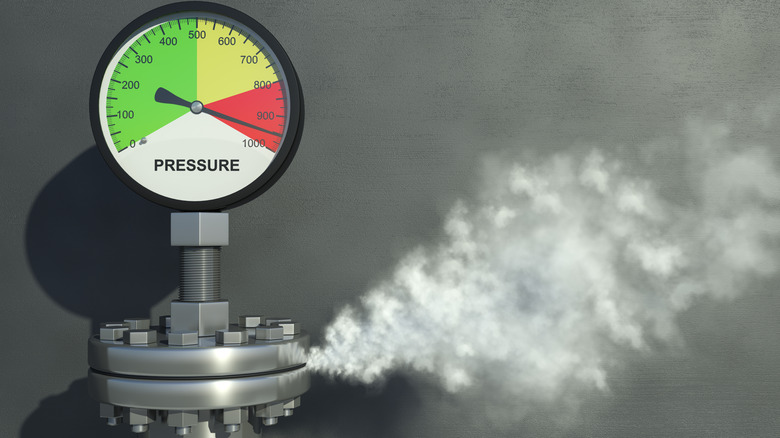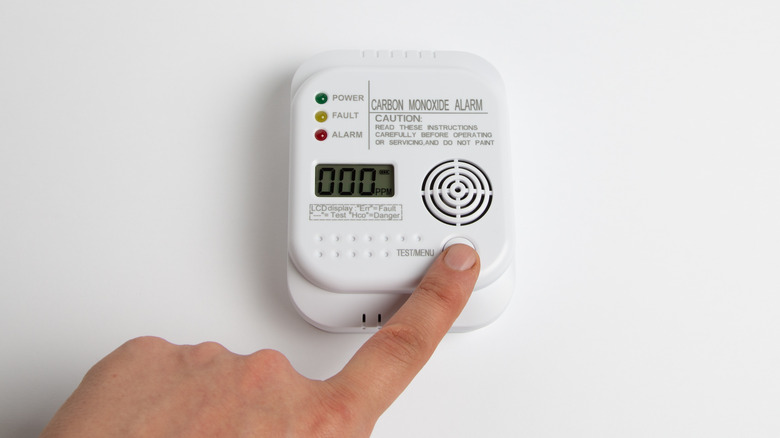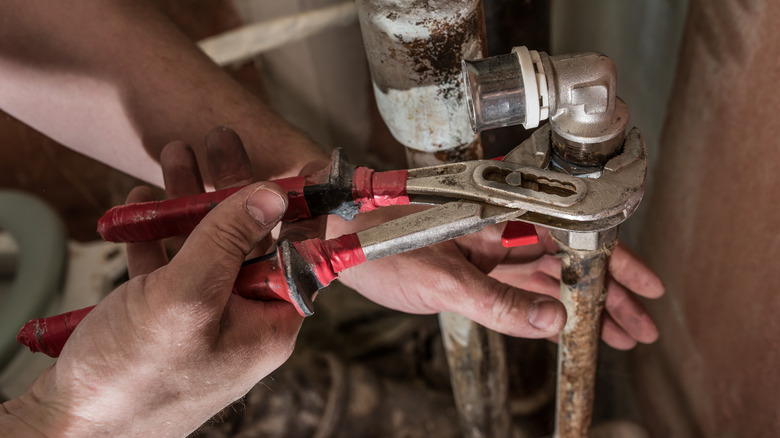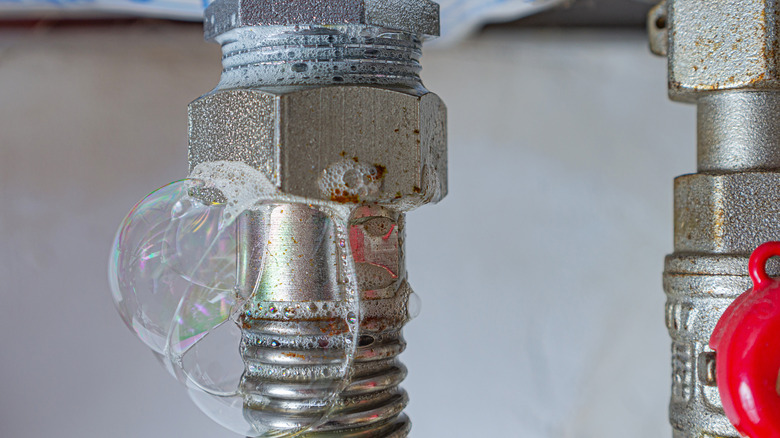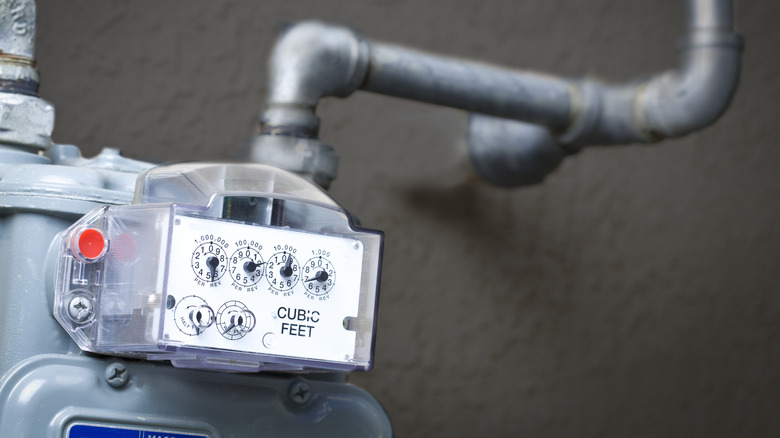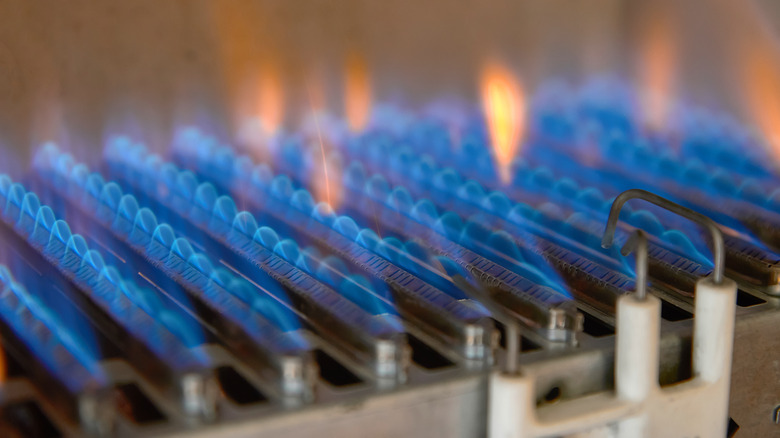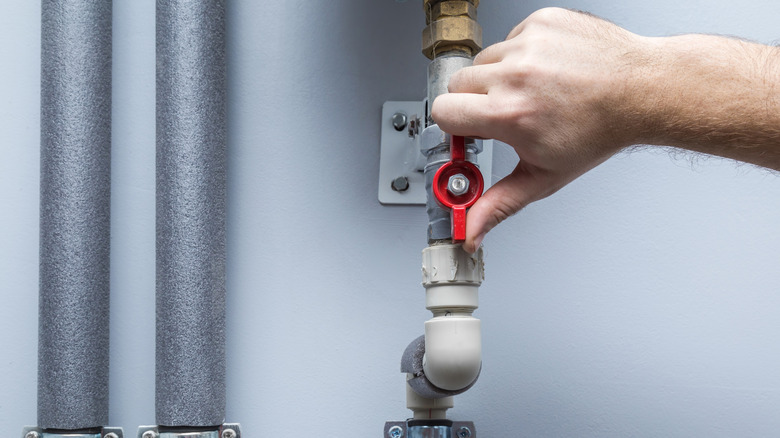How To Determine The Location Of The Gas Leak In Your Home And What To Do About It
Discovering a gas leak in your home is a big deal. Breathing in too much gas can be fatal, so if you think you might have one, you should act immediately. If you currently smell gas or are starting to feel sick with common gas poisoning symptoms, go outside right away to get some fresh air. Take your family with you, including pets, and call your gas company to report the leak. If you feel sick and need medical attention, call 911. However, if you are just planning for the things to look out for, then keep reading.
Sometimes gas leaks are easy to discover because you can smell them or suddenly feel unwell. But sometimes, they might be so subtle that you just have a hunch something is slightly "off." We will cover both instances so you can be better equipped to protect yourself, your loved ones, and your property from potential hazards associated with gas leaks.
Check for the smell
Natural gas is inherently odorless and colorless, which poses a significant safety risk as it can go undetected in the event of a leak. To address this concern, gas companies put in an odorant called Mercaptan, which gives it a distinct rotten egg smell. This odor is strong and smells pretty gross, but it is a crucial safety feature. Adding Mercaptan ensures that even small gas leaks can be quickly identified, prompting immediate action to prevent potential hazards like house fires, explosions, or asphyxiation. If the odor is concentrated more in one room than others, you know the leak is coming from that area.
However, there is one catch — you have to be awake to catch it. Unfortunately, research suggests that natural gas smells aren't bad enough to wake a sleeping person. So even though it is putrid, relying on your nose to detect all gas leaks might not be sufficient. In addition, other types of gas like carbon monoxide don't have a smell, taste, or color, nor do they have Mercaptan added to them. Because of this, you should invest in a gas leak detector for an added layer of safety.
Use a gas leak detector
Gas leak detectors can identify the presence of gas leaks early, usually well before we can smell gas or start feeling sick. There are a few different types of gas leak alarms. The first is a catalytic bead sensor, which uses a chemical reaction to gauge if there is gas in the room. There is a bead in the device coated with a catalyst, which reacts with the gas and alerts you that something is amiss.
There are also infrared sensors, which measure the absorption of infrared light by gases. Different gases absorb specific wavelengths of infrared light, allowing the detector to identify the presence of a particular gas. On the other hand, semiconductor sensors change their electrical conductivity in the presence of certain gases. When a gas comes into contact with the sensor, it alters the electrical properties, triggering an alarm.
No matter which option you choose, it can give you much-needed peace of mind when it comes to gas safety. All three will let you know there is gas in your house, but a portable detector can be used to figure out which room it's specifically coming from. You can purchase a gas leak detector from most local hardware stores and online.
Listen for hissing sounds
If you use a gas stove, you will know that there is a familiar hissing sound constantly humming away in the background while we are cooking. This noise is the gas flowing from the tank up to the burner. However, if you hear it when you are not using the stove, you likely have a gas leak or didn't turn off the appliance correctly. If you hear this noise, there are a few things you can do to take action. The first is to open a window. If you are checking for a gas leak, it's always good to have circulation in the room so the gas doesn't accumulate.
Next, check all the knobs on the stove and any other gas appliances you might have in the room. If you can hear it hiss, that means the leak is substantial, making it a cause for concern. Are they fully off? If so, evacuate the house and call the gas company. Request for a technician to come and investigate.
Look for physical signs
If the pipes carrying gas throughout a building are old and worn out, the space is at risk for a gas leak. Corrosion is a natural process, but it will weaken the pipes and lead to dangerous leaks. If you think you smell gas, look at the lines near the appliances, including the stove and water heater. Examine the gas pipes, connectors, and fittings for visible signs of damage, corrosion, or wear. If you find a particularly corroded spot, that might be where the gas is coming from. If you rent, contact your landlord to get immediate help. If you own your home, you can speak to your gas company about the best options for replacing the piping concerning your safety.
Exterior gas lines can also age and cause gas leaks. You can call your gas company and speak to them about the last time they performed maintenance on the pipes leading into and out of a building. Typically, they will come out and do an inspection once a year, but they will also come after a natural disaster or if something seems wrong.
Perform a bubble test
If you can't smell or hear a gas leak and aren't feeling sick, but still think there might be one, you can perform the "bubble test." To do this, mix a solution of soap and water and apply it to gas pipes, connections, and fittings. Any dish soap will do. The key is to have enough soap to produce visible bubbles, but not make it overly concentrated. You can spray it on the area, or dribble it over the pipe slowly. Once applied, if there is a leak, bubbles will form around it. The bigger the bubbles, the more gas is escaping, so the bigger the leak.
However, there are a few caveats to performing the bubble test. The first is that it's only a safe idea for detecting leaks in gas lines or connections that use a "safe" gas, like natural gas or propane. It is not recommended for testing potentially hazardous or toxic gases. While testing, you should always open a window to let air circulate.
Monitor gas meter readings
If you think you might have a gas leak but can't smell anything and feel okay, you can turn off all gas appliances in your home and check the gas meter. If the meter continues to move or shows consumption even when everything is turned off, it may indicate a gas leak. This isn't the same as turning the gas for your entire home off, but rather shutting off the intake valve at each appliance.
Here is the best practice: First, find the gas meter in your home. It is usually located outside near the front or side of the house. The meter is typically housed in a metal or plastic box with a clear display showing the gas usage. Start by taking a baseline reading of the gas meter when all gas appliances and devices in your home are turned off. Make a note of the numbers displayed on the meter, including any decimal places.
After taking the baseline reading, avoid using any gas appliances for at least 12 hours. During this time, make sure all gas-consuming equipment, like stoves, water heaters, and furnaces, is turned off. After the waiting period, recheck the gas meter and compare the current reading with the baseline reading you noted earlier. If there is a significant increase in the reading despite no use of gas appliances, it could indicate a potential gas leak. At this point, you should call the gas company for further instructions. They will likely send over an official to find the leak for you. If it's urgent, call 911 instead.
Check the pilot lights
If the pilot lights on your gas appliances frequently extinguish or have an irregular flame pattern, it could be a sign of a gas leak. If you notice that the pilot light on your water heater, furnace, or oven keeps going out repeatedly or fails to stay lit, call your gas company immediately. This happens because leaks can disrupt the gas flow to the pilot light, causing it to extinguish frequently or fail to ignite altogether. That means the leak is likely coming from that specific appliance.
In addition, pilot lights should have a steady, blue flame. If you see a pilot light with a yellow, flickering, or erratic flame, it may indicate a gas leak. The presence of excess gas or impurities can affect the combustion process and alter the color and behavior of the flame. Remember, you should only inspect your pilot lights if you cannot smell gas or don't feel sick. If either of those things happens, you need to evacuate. In this case, there would be no need to check the pilot lights for confirmation, as the gas company can do that safely later on.
Avoid open flames or sparks
When you have confirmed you have a gas leak, the first thing to do is to avoid creating open flames or sparks. Do not light matches, candles, stove burners, or make any other open flame, even if the power is out. Additionally, avoid using any electrical devices so as not to create accidental sparks, as they can ignite the gas and lead to a fire. That means you must avoid using electrical switches, appliances, or even phones, as they could create sparks and ignite the gas.
This means that you should call emergency services from outside your home. If you call them on a landline from inside the house, they might advise you not to hang up when you leave, as doing so might cause a spark. Since it's relatively easy to create static, the best thing to do is exit your house immediately. This leads us to our next point.
Evacuate the premises
Again, it's time to leave the premises immediately if you smell gas or start feeling sick. When leaving, taking the entire family with you is important, including pets like dogs, cats, birds, and the like. If you live in an apartment building, you should knock on your neighbors' doors as you exit to inform them of the risk, as it is unlikely your home is the only one impacted. Do this even if it is the middle of the night.
A small thing you can do to give yourself extra time to warn everyone is open the windows and doors in your home as you leave. Opening as many windows or doors as possible will allow the gas room to dissipate and bring fresh air into the house. This decreases the overall risk, as there will be less gas buildup for you to breathe in because it can no longer accumulate. However, the most important thing to do is to get out. Don't put yourself at risk by opening doors and windows if your symptoms are becoming worse. Simply leaving the door open behind you as you exit is enough. Stand a safe distance back from the building and wait for help to arrive.
Contact emergency services and the gas company
Once you are safely outside, call emergency services for help. This could be the fire department or the local gas company's emergency line. Let them know there is a gas leak and provide any relevant information they may require. They will want to know things like your name, address, symptoms, and why you suspect the leak. Follow any instructions they may give you and wait for their arrival at a safe distance.
It's a good idea to have your gas company's number ahead of time so you are not scrambling to find it in a gas leak emergency. To find it, start by checking your recent utility bills, specifically the section related to gas service. The statements usually include the name of your gas company or utility provider, as well as their contact information. If you are renting a property, contact your landlord to ask who to call for a gas leak. Once you get it, add it to your contacts list so you have it handy. Of course, if you suspect a gas leak and have evacuated your home with symptoms, you can always call 911.
Shut off the gas supply
If it is safe, you can turn off the entire gas supply for a building at the main valve. The main valve is usually located at the gas meter or where the gas line enters the building. If you are unsure or unable to safely shut off the gas, leave it to the professionals. Emergency services will not typically ask you to turn off the gas yourself, but you might need to if there is a special circumstance, like a gas leak after a natural disaster.
Do not turn off your gas without cause, either, as you will need to call the gas company to come out and restart it. If you are performing any sort of work around the house that requires you to shut off the gas, call your supplier ahead of time to get the best advice for your specific situation. Typically, you will just turn off the gas for a specific appliance with a nearby valve. This can also come in handy when you suspect a leak but cannot smell the gas and don't feel sick. If you need to wait for help to arrive, you can turn off the gas to the appliance in question while waiting.
